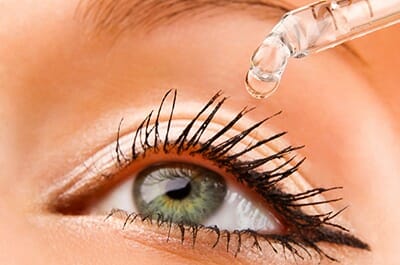What to Do About Dry Eyes

Millions of Americans suffer from dry eyes. If you are one of those, then you know what it feels like to deal with the itchy, scratchy, and sometimes burning sensations. In brief, dry eye syndrome is caused by lack of sufficient lubrication on the eyes. This means that either an inadequate amount of tears is being produced, or that tears are evaporating too quickly to provide the required lubrication.
Either way, there are solutions to dealing with persistent dry eyes. Here, we unpack a few of those ideas.
Tears and Dry Eyes
Tears are essential to maintaining healthy eyes, as they wash out the dust and various other particles that can get into the eye. They also serve to keep the eyes moist, which aids in clear vision, and they reduce the chance of eye infection. For people with dry eye syndrome, their eyes either don’t produce enough tears or the tears that are produced evaporate too quickly to achieve this intended result.
The lack of sufficient lubrication is what causes the symptoms of itchiness, scratchiness, and sometimes burning sensations. In advanced cases of dry eye syndrome, the eye itself can even be damaged, further impairing vision.
Causes of Dry Eyes
There are a number of common causes for dry eye syndrome, but the most common is simply aging. Most adults over the age of 65 will experience some form of dry eye syndrome. Pregnancy can also cause dry eyes in women, due to hormonal changes. Some medications such as antihistamines and antidepressants might cause dry eyes as a side effect.
The environment can also play a factor in the condition. Smoke, wind, pool chlorine, and especially dry climates can dehydrate the eyes quicker than usual. Some long-time users of contact lenses can experience dry eyes, as well. Finally, some people just have a medical condition where their eyes don’t produce enough tears.
Treatment for Dry Eye Syndrome
If you have a minor condition of dry eyes, then over-the-counter eye drops might be sufficient for relief. These drops simply “add tears” to your eyes, in order to make up for a lack of natural tears. For most minor causes of dry eyes due to such factors as aging, over-the-counter eye drops are effective.
For slightly more severe cases, your optometrist can offer prescription eye drops, which initiate greater tear production from your glands. Another approach instead of adding tears is to conserve the tears already produced by the eye. This is done by blocking the tear ducts that tears drain into. Tiny silicon gel plugs can be used to achieve this effect, but for severe cases, there is also a surgical procedure that can permanently prevent tears from draining too quickly.
[Photo Via: Gregory Eye Care]

